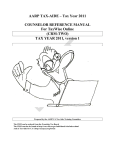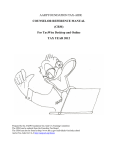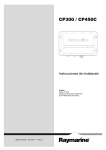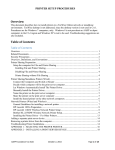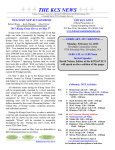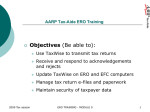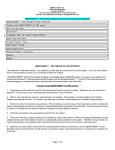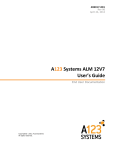Download Client Service Provider Digest - MA Tax-Aide
Transcript
Client Service Provider Digest 2014 - 15 Table of Contents INTRODUCTION 3 AARP FOUNDATION TAX-AIDE VALUE PROPOSITION AND ORGANIZATION 4 AARP FOUNDATION TAX-AIDE CUSTOMERS 6 AARP FOUNDATION TAX-AIDE ORGANIZATION 7 AARP FOUNDATION TAX-AIDE VOLUNTEER POSITIONS- GENERAL GUIDELINES AND POLICIES FOR ALL CLIENT SERVICE PROVIDER POSITIONS CONFLICT OF INTEREST GUIDELINES 8 9 CONFIDENTIALITY AND SECURITY OF TAXPAYER DATA SUMMARY 10 AARP FOUNDATION TAX-AIDE POSITION DESCRIPTIONS 11 COUNSELOR (COU) SHIFT COORDINATOR (SCO) CLIENT FACILITATOR (CF) ELECTRONIC RETURN ORIGINATOR (ERO) 11 12 14 16 AARP FOUNDATION TAX-AIDE PROGRAM ADMINISTRATION 18 SITE GUIDELINES 18 EXPENSE REIMBURSEMENT 21 INSURANCE COVERAGE 23 ACCIDENT INSURANCE 23 STANDARDS OF PROFESSIONALISM 24 TAXPAYER INFORMATION AND RESPONSIBILTIES 25 CONFIDENTIALITY AND SECURITY OF TAXPAYER DATA 26 DATA SECURITY TAXPAYER DATA RETENTION (TAXWISE DESKTOP ONLY) PHYSICAL SECURITY REPORTING A LOSS 27 28 28 29 APPENDIX A: GETTING STARTED ON THE PORTAL 30 APPENDIX B: COMMON ISSUES USING PORTAL 34 APPENDIX C: OTHER LANDING PAGE LINKS 36 APPENDIX D: VOLUNTEER ASSESSMENT 37 APPENDIX E: DIRECT DEPOSIT FORM 39 INTRODUCTION Welcome to another season of AARP Foundation Tax-Aide! More than 35,000 volunteers serve taxpayers each year, making this program the largest of its kind in the nation. Thank you for being a part of this special program that assisted over 2.6 million taxpayers last year. This Client Service Provider Digest is intended for Counselors (COU), Client Facilitators (CF), Shift Coordinators (SCO), and Electronic Return Originators (ERO); it will provide you basic information on the policies and procedures of the AARP Foundation Tax-Aide program as well as position descriptions for these four volunteer positions. More detailed information is available on the Volunteer ShareNet (volunteers.aarp.org) and in your training including the Volunteer Polices and Procedures training. Client Facilitators in particular should look for a manual dedicated to them which describes their position in detail. Further information about the policies and procedures in this digest are detailed in documentation on the Volunteer ShareNet > Policies and Procedures in the Policy Manual and Operational Guidelines. Your volunteer supervisor, the Volunteer Standards of Conduct training/test, and the Volunteer Policies and Procedures presentation you should have received in training are important resources for you as well. For information about getting started on the Portal and the Volunteer ShareNet please refer to Appendix A. AARP Foundation AARP Foundation is working to win back opportunity for struggling Americans 50+ by being a force for change on the most serious issues they face today: housing, hunger, income and isolation. By coordinating responses to these issues on all four fronts at once, and supporting them with vigorous legal advocacy, the Foundation serves the unique needs of those 50+ while working with local organizations nationwide to reach more people, strengthen communities, work more efficiently and make resources go further. AARP Foundation is AARP’s affiliated charity. Learn more at www.aarpfoundation.org. AARP AARP is a nonprofit, nonpartisan organization, with a membership of nearly 38 million, that helps people turn their goals and dreams into real possibilities, strengthens communities and fights for the issues that matter most to families such as healthcare, employment and income security, retirement planning, affordable utilities and protection from financial abuse. We advocate for individuals in the marketplace by selecting products and services of high quality and value to carry the AARP name as well as help our members obtain discounts on a wide range of products, travel, and services. A trusted source for lifestyle tips, news and educational information, AARP produces “AARP The Magazine”, the world's largest circulation magazine; AARP Bulletin; www.aarp.org; AARP TV & Radio; AARP Books; and AARP en Español, a Spanish-language website addressing the interests and needs of Hispanics. AARP does not endorse candidates for public office or make contributions to political campaigns or candidates. The AARP Foundation is an affiliated charity that provides security, protection, and empowerment to older persons in need with support from thousands of volunteers, donors, and sponsors. AARP has staffed offices in all 50 states, the District of Columbia, Puerto Rico, and the U.S. Virgin Islands. Learn more at www.aarp.org. 2014-2015 AARP Foundation Tax-Aide Client Service Provider Digest Page 3 of 40 AARP FOUNDATION TAX-AIDE VALUE PROPOSITION AND ORGANIZATION Giving peace of mind and economic benefits to taxpayers, families, Value Proposition communities, and partners, AARP Foundation Tax-Aide’s knowledgeable volunteers deliver free, high quality tax services. Who We Are AARP Foundation Tax-Aide is the nation’s largest volunteer-run tax assistance and preparation service, preparing tax returns and answering tax questions free of charge. AARP Foundation Tax-Aide is offered in conjunction with the IRS. Where We Serve Our Taxpayers Most taxpayers receive in-person assistance at nearly 5,000 sites nationwide. Free electronic filing is offered at all sites. Sites are located in malls, libraries, banks, senior centers, and other convenient facilities. How Many Volunteers Approximately 35,000 volunteers make up AARP Foundation Tax-Aide. Virtually all volunteers provide tax assistance, and 7,600 are also volunteer leaders. Program and Structure and Administration AARP Foundation Tax-Aide is a nationwide, volunteer-run program. Regional and state volunteer leaders share in setting policies, while also assuming most supervisory and operational responsibilities. Counselors provide all service-level tax assistance. Electronic Return Originators (EROs) manage the tasks related to e-filing the tax return. Client Facilitators provide a first point of contact for taxpayers and keep service orderly and efficient. Instructors provide tax training to Counselors. Shift Coordinators and Local Coordinators provide site leadership. Coordinator and Specialist Roles Coordinators, in general, recruit and supervise volunteers at all levels. Shift Coordinators (SCOs) assist in managing the sites while they are open. Local Coordinators (LCs) manage assigned site(s), ensuring site compliance with program policy, activity reporting, and Counselor reimbursement, and may be responsible for volunteer recruitment and training, volunteer certification, site creation, database accuracy, and other activities. District Coordinators (DCs) manage activity at the district level and recruit and supervise Local Coordinators. State Coordinators (SCs) oversee all state activities and set state operation policies. Administrative Coordinators (ACs), Communication Coordinators (CCs), Technology Coordinators (TCs), and Training Coordinators (TRCs) support their specialty interests at the local levels. Specialists support administration, partnerships and communications, technology, prospective volunteers, and training needs at the state level. Regional advisors assist the Regional Coordinators in their areas of expertise. Regional Coordinators (RCs) guide and supervise State Coordinators and serve on the National Leadership Team (NLT). 2014-2015 AARP Foundation Tax-Aide Client Service Provider Digest Page 4 of 40 The National Leadership Team (NLT), consisting of volunteer Regional Coordinators, National Committee Chairs, and select National Office staff, National develop and implement AARP Foundation Tax-Aide goals and objectives. Leadership Team National committees support the areas of leadership development, and National operations, technology, and tax training. National staff coordinate program Office Staff policies, maintain relationships with the IRS and other key partners, support volunteer leaders, collect and report program impact, costs, and other data. Electronic Filing AARP Foundation Tax-Aide offers free electronic filing at all sites nationwide, using IRS-provided tax-preparation software. Internet Tax Assistance Since 1998, AARP Foundation Tax-Aide has a 24-hour year-round Internet tax assistance service at its Internet site (www.aarp.org/taxaide). Taxpayers can pose questions online and get quality-reviewed answers back within a few business days. Volunteers interested in participating in this service can sign up using the Online Tax Assistance Application Information document on the Volunteer ShareNet > General Program Mgmt. and Forms. Located at www.aarp.org/taxaide, our website offers tax assistance, frequently asked tax questions, tax-preparation site locations, and other Website Features program information. Information on AARP Foundation Tax-Aide volunteer opportunities is also available on the website. Interested persons can visit www.aarp.org/taxaide, where an online volunteer How to Volunteer recruitment form can be located and filled out. Volunteering positions are available for everything from technical support, tax preparation, via web communications, training, administrative support, and leadership. Volunteer Leadership Positions Tax training and certification is encouraged, but it is not required for many leadership positions. Leadership position descriptions are provided on the Volunteer ShareNet > Leadership Development. Volunteer Policy AARP Foundation volunteers will receive equal opportunity and treatment throughout recruitment, appointment, training, and service. There will be no discrimination based on, but not limited to race, nationality, gender, disability, sexual orientation, gender identity, or religion. This policy applies to all volunteers. . 2014-2015 AARP Foundation Tax-Aide Client Service Provider Digest Page 5 of 40 AARP FOUNDATION TAX-AIDE CUSTOMERS How Many During the 2014 tax season, from late January to April 15, we served over 2.6 Customers million customers. Over the past 47 years, we have served more than 58 million customers. The information below can be useful for publicity and general discussion. Who they are (from 2014 survey) Customer Age Gender Race/Ethnicity Household Income (annual) Repeat Customers Employment Status 6% 18-49 8% 50-59 27% 60-69 67% Female 81% White non-Hispanic 5% Hispanic/Spanish/Latino 1% American Indian/Alaska Native 27% Under $20,000 24% $20,000- $29,999 16% First Time 30% Two- Three Times 10% employed full time 74% Retired/not seeking work 33% 70-79 25% 80+ 2% No answer 33% Male 8% Black or African American 2% Asian/Pacific Islander 3% Other 26% $30,000-49,999 12% $50,000 or more 10% No answer 32% Four- Six Times 21% Seven+ Times 12% employed part time 3% Unemployed What they think Overall quality of AARP Foundation Tax-Aide’s service Helpfulness of volunteers Tax knowledge of volunteers How well the volunteer explained the tax return to them Would they recommend AARP Foundation Tax-Aide to others? 88% Excellent 91% Excellent 83% Excellent 83% Excellent 88% Extremely likely Who would help them with their taxes if they didn’t use AARP Foundation Tax-Aide? 56% Pay for Assistance 6% IRS 35% Self or Friend 1% Not file How satisfied are you with Tax-Aide service? 97% very satisfied How did you hear about Tax-Aide? 48% from another person 22% newspaper or newsletter 11% some other way 10% another AARP source 2% on TV or radio 1% from the IRS 3% No answer What type of impact has Tax-Aide had on your life? (Top 2 answers): 86% It gives me peace of mind knowing that my taxes are being prepared by a knowledgeable volunteer 64% It has reduced the anxiety I have when I do my taxes (Source: 2014 AARP Foundation Tax-Aide Customer Satisfaction Survey- results are rounded and may not total 100% due to rounding.) 2014-2015 AARP Foundation Tax-Aide Client Service Provider Digest Page 6 of 40 AARP FOUNDATION TAX-AIDE ORGANIZATION (The reporting structure on this chart flow down from those critical volunteers serving taxpayers.) 2014-2015 AARP Foundation Tax-Aide Client Service Provider Digest Page 7 of 40 AARP FOUNDATION TAX-AIDE VOLUNTEER POSITIONS- GENERAL GUIDELINES AND POLICIES FOR ALL CLIENT SERVICE PROVIDER POSITIONS Purpose of Program AARP Foundation Tax-Aide provides free income tax assistance and preparation to low- and moderate-income taxpayers, with special attention to those age 60 and older. Volunteer Standards of Conduct All volunteers must take and pass the IRS-developed Volunteer Standards of Conduct training and test in order to work in the AARP Foundation TaxAide Program. They must also agree to these standards by signing the Volunteer Standards of Conduct form. Certification In order to be certified to provide tax assistance, all volunteers, in addition to fulfilling the Standards of Conduct requirements, must attend appropriate training classes. Details of these requirements are found under the specific position descriptions. Counselors and EROs also must pass the IRS provided test in tax law at the advanced level and complete the required practice problems in order to hold those positions. AARP Foundation Tax-Aide volunteers are certified for one year, and contingent upon satisfactory annual review, may be re-certified in Length of Service subsequent years. The tax season runs from late January through April 15, or through October 15 if assisting taxpayers after April 15 with questions or and Eligibility late returns. For volunteers assisting taxpayers through the program’s website, the tax season is the entire year. Nondiscrimination Volunteers must work well with diverse populations and always treat taxpayers and other volunteers with respect and courtesy, regardless of, but not limited to their race, nationality, gender, disability, sexual orientation, gender identity or religion. Program Promotion Volunteers should support and promote the program through word-ofmouth, not only to advertise the tax-preparation service, but to recruit new volunteers. Available Resources Volunteers will be provided with the resources necessary to fulfill their responsibilities, including 16 to 36 or more hour training classes, printed reference materials, and online information sources. AARP Foundation Tax-Aide provides limited insurance coverage and reimbursement for covered travel expenses. See specific sections of this digest for details on these topics. Adherence to Program Policies All volunteers are expected to adhere to program policies and procedures, including scope and site guidelines, conflict of interest and avoiding unacceptable activity policies, confidentiality requirements, and the IRS Volunteer Standards of Conduct and the AARP Standards of Professionalism. The AARP Standards of Professionalism are contained later in this digest. Failure to comply with any of these policies, procedures or standards could be grounds for removal from the program. 2014-2015 AARP Foundation Tax-Aide Client Service Provider Digest Page 8 of 40 CONFLICT OF INTEREST GUIDELINES Volunteers must not accept compensation for the performance of their duties. Not Accepting Compensation includes fees, gratuities, or other dispensations to volunteers or Compensation to members of the volunteer’s immediate family or household. Conflict of Interest It is important that AARP Foundation Tax-Aide volunteers avoid either a conflict of interest or the appearance of a conflict of interest, when conducting AARP Foundation Tax-Aide activities. A conflict of interest, or the appearance of a conflict of interest, occurs when an AARP Foundation Tax-Aide volunteer engages in providing a service with a profit motive conducted as an employee or an independent contractor, or when a member of the volunteer’s immediate family or household participates in such an activity. All volunteers are required to disclose any potential conflict of interest to their supervisor who will inform others of the conflict, or appearance of a conflict, leading to a determination in writing by the State Coordinator or Regional Coordinator of whether the activity described is an unacceptable conflict of interest. Obligation to Avoid Unacceptable Activities Volunteers, including AARP Foundation Tax-Aide volunteers, while representing the AARP Foundation or participating in an AARP Foundation Tax-Aide activity, shall not promote products, services, or political candidates or issues, nor make use of their relationship with AARP, AARP Foundation or AARP Foundation Tax-Aide for personal profit or the profit of any other individual(s). Volunteers, representing themselves as AARP Foundation TaxAide volunteers, are specifically prohibited from engaging in any legislative and/or lobbying activity. Certain AARP activities, such as advocacy and AARP membership drives, may not be suitable for AARP Foundation Tax-Aide volunteers or for co-programming at AARP Foundation Tax-Aide sites. Personal Financial Gain Volunteers must never solicit any business from taxpayers they assist or use the knowledge they have gained about them for any direct or indirect benefit for themselves or any other specific individual or business. 2014-2015 AARP Foundation Tax-Aide Client Service Provider Digest Page 9 of 40 CONFIDENTIALITY AND SECURITY OF TAXPAYER DATA SUMMARY Maintaining the confidentiality and security of taxpayer data must be given the highest priority. General guidelines for volunteers are below; further guidelines, for tax-preparation sites, are found under the “Site Guidelines” section. For additional details, see the full section that outlines the program confidentiality and security policies on page 30. Standards of Conduct All AARP Foundation Tax-Aide volunteers must sign the IRS Standards of Conduct agreement (IRS Form 13615), which contains provisions on confidentiality. Non-program volunteers who have access to taxpayer data must also sign the agreement. Taxpayer Documents All returns must be prepared in front of the taxpayer, and all taxpayer records, including the Interview and Intake sheets must be returned to the taxpayer at the end of the assistance session. Preparing the Return Volunteers must provide tax-preparation assistance in a manner that promotes confidentiality for the taxpayer. Care should be taken in how information is communicated; conversations should be held discreetly, so that they cannot be overheard by others. Personal taxpayer information and documents should not be left out where others might see them. If a Counselor needs to leave the work area during a tax-assistance session, the computer display screen should be minimized or the application closed down. Volunteers must exit TaxWise before leaving their computer for a break or close the lid on the laptop when stepping away while working with taxpayer data. “Need to Know” Information provided for tax return preparation must not be shared with anyone who does not have a need to know. Individuals have a need to know if their involvement is required at any stage to accurately complete or process a return or to respond to questions about the return. It is acceptable, for instance, to share information in order to obtain guidance in properly completing a return, to have a quality review done, or to transmit the return. It is not acceptable to share information with others, even with other volunteers, if their involvement with the tax return preparation is not required. For instance, sharing information about income, birth dates, or the marital status of taxpayers with other volunteers, taxpayers, family, or friends, just as a matter of curiosity or interest, is not permitted. Operating System No computer in the program may use Windows XP or earlier. All computers with the Windows XP or earlier operating systems in use in the program must be updated to Windows 7/Vista or higher or be disposed of. This includes all computers: site provided, donated and personal computers. All computers must be using Windows Vista or later Windows operating system editions when used in the Tax-Aide program. Windows XP is NOT being supported and its use is more and more likely to result in a security breach causing problems for the taxpayer and the program. 2014-2015 AARP Foundation Tax-Aide Client Service Provider Digest Page 10 of 40 AARP FOUNDATION TAX-AIDE POSITION DESCRIPTIONS COUNSELOR (COU) Purpose of Position Counselors, under the direction of the Local Coordinator or Shift Coordinator, provide tax assistance and preparation service to taxpayers. Responsibilities of Position In accordance with the policies and procedures of the AARP Foundation Tax-Aide program, the Counselor: Prepares tax forms and/or answers questions to the extent of his/her current tax training and certification, at assigned tax assistance sites. Reviews tax returns prepared with taxpayers since taxpayers are responsible for the accuracy of the return. Adheres to site schedules and guidelines. Accepts no money or other gratuity for services. Maintains the strict confidentiality and protects the security of all taxpayer information and records at all times. Adheres to program policies and procedures especially the IRS Volunteer Standards of Conduct and the Counselor Guidelines and Confidentiality and Security of Taxpayer Data sections in the Client Service Provider Digest and the AARP Foundation Standards of Professionalism. Promotes and supports the program through word-of-mouth and wears an AARP Foundation Tax-Aide name badge while serving at a site. Records assistance given and Quality Review completed as directed by the Local Coordinator. Qualifications Counselors must pass the IRS Voluntary Standards of Conduct (VSOC) test and the Advanced level of the IRS test to be certified by the IRS for the purpose of providing tax assistance in this program and agree to by signing it, the IRS Volunteer Standards of Conduct (IRS Form 13615). Time, Training, and Travel Typically, Counselors are required to volunteer at least an average of four hours a week during the tax season, usually from February 1 to April 15, plus 16-36 or more hours of training in December or January. Counselors acquire tax knowledge through attendance at Counselor class and may also use the online training course. Counselors must also be trained in program policy and to properly record assistance given on the activity log. Counselors travel locally to training and sites. Appointment, Supervision, and Scope of Authority Counselors are appointed annually. They are assigned to sites by the District or Local Coordinator after IRS certification and program policy and administrative training sessions are completed. Counselors report directly to the Local Coordinator and do not supervise any other volunteer. Experienced Counselors may be assigned to mentor new Counselors. Working Relations and Progress Review Counselors work closely with taxpayers, Electronic Return Originators (EROs) when e-filing, and their Local Coordinator. Local Coordinators evaluate Counselors on an on-going basis and provide feedback. 2014-2015 AARP Foundation Tax-Aide Client Service Provider Digest Page 11 of 40 Purpose of Position SHIFT COORDINATOR (SCO) Under the direction of the Local Coordinator, the Shift Coordinator (SCO) is responsible for coordinating and managing all phases of site operations at a specific site during an assigned period of time (shift) acting for the Local Coordinator (LC). Responsibilities of Position In accordance with the policies and procedures of the AARP Foundation Tax-Aide program, the Shift Coordinator (SCO): Manages site operations for a specific shift, including physical setup, following local and district policies Complies with the Quality Site Requirements Manages the activities of the Counselors, Client Facilitators, and ERO assigned to the shift. Arranges for substitutes as needed Oversees the flow of taxpayers to Counselors considering the difficulty of the return and the experience of the Counselor Provides or directs other Counselors to provide quality reviews for all returns Reports issues/problems to Local Coordinator Ensures that all program data security procedures are followed Ensures that completed and quality reviewed returns are promptly identified to the ERO and transmitted in accordance with the schedule established by the Local Coordinator Ensures that all taxpayer material is properly secured, including during and at the end of the shift Ensures that equipment is properly secured and that host-provided equipment has been arranged or stored as agreed upon at the end of the shift Completes the Site Activity Log as directed by the Local Coordinator Advises the Local Coordinator of the need for supplies for future shifts Reports equipment problems and status to the Local Coordinator Adheres to program policies and procedures especially the IRS Volunteer Standards of Conduct and the Counselor Guidelines and Confidentiality and Security of Taxpayer Data sections in the Client Service Provider Digest and the AARP Foundation Standards of Professionalism. Qualifications The Shift Coordinator must have the ability to implement program policy and provide direct oversight of the program and its volunteers at a site. SCOs should be an experienced Counselor, and experience as an ERO is most desirable. The SCO must have passed the IRS certification exam and signed the IRS Volunteer Standards of Conduct form. The position requires major effort during the tax filing season, late January to April. Some time will be required prior to the start of the season for Time, Training, & management training. The SCO must acquire a current knowledge of Travel operational and administrative procedures associated with the program as provided by the National Office, DC, and LC. 2014-2015 AARP Foundation Tax-Aide Client Service Provider Digest Page 12 of 40 Appointment and Supervision, & Scope of Authority The SCO is appointed annually by the Local Coordinator with the concurrence of the District Coordinator and reports directly to the Local Coordinator. The SCO assists the LC in matters relating to the operation of the site and manages the activities of the ERO, Counselors, and Client Facilitators assigned to their shift. The LC remains the supervisor of all volunteers assigned to a site. Working Relations & Progress Review The SCO works closely with the Local Coordinator and with members of the district staff as needed. The SCO’s performance is monitored on an ongoing basis and reviewed annually by the Local Coordinator. 2014-2015 AARP Foundation Tax-Aide Client Service Provider Digest Page 13 of 40 CLIENT FACILITATOR (CF) Purpose of Position The Client Facilitator (CF) works with the Local Coordinator/Shift Coordinator (LC/SCO) and performs receptionist-type duties providing an important first contact for taxpayers and keeping service orderly and efficient. Responsibilities of Position In accordance with by the policies and procedures of the AARP Foundation Tax-Aide Program, a CF: Welcomes taxpayers and ensures they are helped in an appropriate order and checked off an appointment log or sequenced on the activity log to be assisted by a Counselor Helps ensure that each taxpayer has brought correct forms, documents, and personal identification required to accurately complete their tax return Determines, with assistance of a site Counselor, when a taxpayer’s return is outside of AARP Foundation Tax-Aide scope Assists taxpayers in filling out portions of the Intake Sheet and other required papers. The CF may not address tax questions (unless also certified as a Counselor) Keeps information (such as waiting time) flowing to taxpayers who are in the waiting area Ensures appropriate production data is entered on the site activity log by the Counselor/quality reviewer as each taxpayer departs, and before another taxpayer is served May assist Counselors and the ERO in maintaining an orderly file system of incoming taxpayers and acknowledged or rejected returns Distributes any appropriate literature to taxpayers Adheres to program policies and procedures including those outlined in the Program Policies and Procedures presentation available on the Volunteer ShareNet and the IRS Volunteer Standards of Conduct Qualifications The CF must receive annual training on program policies and procedures, pass the IRS Standards of Conduct test, and agree to it by signing, the IRS Volunteer Standards of Conduct form. The CF must also be organized, personable, and enjoy working with people. The CF will need skill in dealing with taxpayers that want immediate answers to their tax questions but will sometimes be required to wait for answers from a tax Counselor. Time, Training, and Travel The position is appointed annually and runs during the tax season from late January through April 15th. An average of at least one shift each week is typical during this period. A typical shift takes four to five hours. Training Required Training by the LC will be required to become familiar with program policy, administrative matters such as site activity logs and Intake and Quality Review Form, applicable site procedures, and orientation to the program. Travel Required The CF will not be required to travel except to work at the assigned sites. 2014-2015 AARP Foundation Tax-Aide Client Service Provider Digest Page 14 of 40 Appointment, Supervision, and Scope of Authority The CF is appointed and reports directly to the LC and does not supervise any other volunteer position. Working Relations and Progress Review The CF maintains a close working relationship with the LC/ SCO and the tax Counselors working at the site. The LC monitors the CF’s performance on an on-going basis and provides feedback. Note: In December 2013, a Client Facilitator Manual was introduced to help fully train volunteers in the Client Facilitator role. Please refer to the Volunteer ShareNet > Policies and Procedures > Manuals, Policies and Procedures for an electronic copy. 2014-2015 AARP Foundation Tax-Aide Client Service Provider Digest Page 15 of 40 ELECTRONIC RETURN ORIGINATOR (ERO) Purpose of Position The Electronic Return Originator (ERO) works with the Local/Shift Coordinator (LC/SCO), the Technology Coordinator (TC), and the Counselors to electronically file federal and state tax returns with the IRS and state Departments of Revenue via IRS- provided tax preparation software (TaxWise) and the software provider (CCH SFS). Responsibilities of Position In accordance with the policies and procedures of the AARP Foundation Tax-Aide Program, an ERO: Follows the/a designated process to ensure all completed and only quality reviewed e-file returns are timely transmitted (within three days of creation to CCH SFS Electronic Filing Center (includes state e-files) Assures IRS/state e-file acceptance/acknowledgements or rejection Assures rejected e-file returns are resolved timely Assures that 100% of returns are either e-filed/accepted, paper returns, or otherwise accounted for so no returns remain unresolved at the end of the season Desktop users: maintains any required IRS and State e-file records (including master disk of accepted returns) until the end of the tax season Provides reports as requested by the DC/TC or TCS Provides ongoing support to Counselors preparing e-file eligible returns by answering questions and addressing anomalies that occur during electronic filing procedures. Communicates problems to LC and/or TC for resolution Complies with the Confidentiality and Security of Taxpayer data policies, including deleting all returns off computers by April 30. This document is included in the Client Service Provider Digest, Policy Manual, and is on the Volunteer ShareNet Adheres to program policies and procedures especially the IRS Volunteer Standards of Conduct and the Counselor Guidelines and Confidentiality and Security of Taxpayer Data sections in the Client Service Provider Digest and the AARP Foundation Standards of Professionalism. Qualifications ERO must have a working knowledge of personal computers, software, and electronic communication systems. ERO must pass the required sections of the IRS certification exam and sign the IRS Volunteer Standards of Conduct form to qualify as a Counselor and become proficient with the IRS supplied tax preparation software. Term of Service and Eligibility ERO is appointed for a one-year term and, upon satisfactory annual review and continued Counselor certification, may be re-appointed for subsequent one year terms. ERO is eligible for other AARP or AARP Foundation volunteer positions. 2014-2015 AARP Foundation Tax-Aide Client Service Provider Digest Page 16 of 40 Time, Training, and Travel The position is most active during late January through April. ERO must acquire knowledge of tax law (for reject resolution), electronic filing procedures, including software and hardware issues, as well as an orientation to the AARP Foundation Tax-Aide program. ERO assists in the implementation and operation of district e-filing sites and attends meetings as necessary. The ERO may be required to travel to several tax sites. Appointment and Supervision, and Scope of Authority LC appoints the EROs with the concurrence of the DC. The ERO reports directly to the LC. ERO assists the LC and any SCO in all matters concerning the electronic filing of federal and state tax returns at assigned site(s). Working Relations and Progress Review EROs maintains a close working relationship with the LC, any SCO, Counselors, TC, and CCH SFS for the electronic filing of federal and state tax returns. The ERO’s performance is monitored by the LC with feedback from the district’s TC. 2014-2015 AARP Foundation Tax-Aide Client Service Provider Digest Page 17 of 40 AARP FOUNDATION TAX-AIDE PROGRAM ADMINISTRATION SITE GUIDELINES Taxpayers Served AARP Foundation Tax-Aide provides free tax assistance to taxpayers with lowand moderate-income, with special attention to individuals age 60 and older. Assistance may be provided to individuals under 60 if assistance to those 60 and over is given priority and no additional program expense is incurred. Taxpayers will be served with courtesy and confidentiality, regardless of, but not limited to their race, nationality, gender, disability, sexual orientation, gender identity or religion. Location All tax assistance, except for rare home visits/shut-ins and electronic filing transmission, must be performed at the site. Sites must not be located at individual volunteers’ homes, and volunteers must not prepare returns at the homes of taxpayers (except for home visits/shut-ins and then only as directed by the LC and in accordance with state guidance on home visits/shut-ins). Required Publications All sites must have the following documents at the site for volunteer use: IRS Pubs 17 and 4012, any appropriate state tax instructions, and the Taxpayer Information and Responsibilities document, as well as AARP Foundation TaxAide CyberTax messages identified as “IRS Volunteer Quality Alerts.” Reference documents may be in electronic form. Volunteers must maintain strict confidentiality and security of all taxpayer information and records at all times. Sites must be set up in a manner that Confidentiality minimizes the likelihood that others can hear taxpayer conversations or see and Security taxpayer data on a computer screen or as a hard copy document. Refer to page 30 of this document for additional details. Taxpayers not immediately known by first and last name to the preparer must present photo ID in order to deter identity theft. Exceptions can be made by the Local Coordinator only under extreme circumstances and should not be common practice. Identification and Accuracy of Returns Taxpayers must be asked for and should present SS cards from any SSA document or tax ID numbers for everyone listed on the tax return in order to 1) reduce return rejects and 2) reduce identity theft. Volunteers can validate social security numbers by using various documents issued from the SSA such as social security letters, income statements and other documents issued by Social Security. The National Office does not want to create additional hurdles for well-meaning taxpayers who do not have social security documents at the time of their initial appointment. Allowed at this time is the use of carry-forward data as SSN verification when a taxpayer has acceptable government issued photo ID. When sites open, please check with your supervisor. Please remind all taxpayers to bring official documentation next year. Counselors may not knowingly prepare returns that are inaccurate or that mis-state tax liability. The use of the Intake and Interview process prior to tax return preparation is required, and will help to develop an accurate picture of income sources and potential credits. The Counselor should probe the 2014-2015 AARP Foundation Tax-Aide Client Service Provider Digest Page 18 of 40 taxpayer for further information for any box which is checked “unsure”, and should note on the form any pertinent information provided by the taxpayer. Quality Review Quality review of each tax return by a second certified person, preferably an experienced Counselor, is required. When performed correctly and consistently, quality reviews improve return accuracy, result in fewer rejects, and lead to greater customer satisfaction. Sites must use the appropriate TaxWise Preparer Use Field to record who performed the quality review. This entry is to be keyed in by the volunteer doing the quality review, and must not be defaulted. Finishing the Return When a return has been completed, including quality review, Counselors must review the return with the taxpayer, and explain and ask the taxpayer to sign the Form 8879 that they are agreeing that the return is complete, accurate and ready to e-file to the IRS. Taxpayers must be given one copy of the return and the signed Form 8879. All taxpayer records, including the Interview and Intake sheet, must be returned to the taxpayer at the end of the tax assistance session. No taxpayer records may be retained. Tax Record Envelopes Because of important disclosure information, AARP Foundation Tax-Aide Tax Record envelopes (D12225) must be given to all customers for whom a tax return is prepared. Activity Reporting E-filing Process Recording and reporting tax assistance activity of various sorts is essential to the AARP Foundation Tax-Aide program. The information collected is used to support funding requests to the IRS and AARP Foundation, as well as for program promotion. Maintaining complete and accurate data for the site creates a record of all taxpayers assisted, and assures that the site and the state receive credit for all assistance given. The Site Activity Log was created to assist volunteers in the collection of site information, and can be used to record the types of volunteer tax assistance provided. Volunteers should fill out a line on the Log and record the type of assistance given each time they help a taxpayer. Recording Question and Answers is very important and often overlooked – please give this special attention. Contact your site supervisor with questions on Activity Reporting at your site. All e-file sites must have a process to ensure that all returns to be e-filed are submitted in a timely manner (no more than three days from Quality Review). The site leader(s) must also ensure that acknowledgements are received and checked and verified, and that all problems with rejected forms are resolved. Taxpayers must comply with the program’s “Taxpayer Information and Responsibilities.” A copy of this document must be available at the site for taxpayers to review. It is included in this document for reference. Taxpayer Responsibility (100% goal for Taxpayers retain sole responsibility for the accuracy and completeness of their tax returns. Counselors should encourage taxpayers to participate, to the extent 2015) possible, in preparing their own tax forms. Counselors must thoroughly review the return with the taxpayer, explain with asking the taxpayer to sign the Form 2014-2015 AARP Foundation Tax-Aide Client Service Provider Digest Page 19 of 40 8879 that they are agreeing that the return is complete, accurate, ready to e-file to the IRS and that they understand they are responsible for the return. IRS Support IRS offers toll-free assistance to AARP Foundation Tax-Aide Counselors, as part of the TCE program, at 1-800-829-8482. 2014-2015 AARP Foundation Tax-Aide Client Service Provider Digest Page 20 of 40 EXPENSE REIMBURSEMENT Reimbursable Expenses Program volunteer expenses are reimbursable for training activity conducted after October 1 and for tax assistance provided during the standard 1040 filing season through April 20. Counselors, Client Facilitators, Shift Coordinators, and EROs (hereafter referred to as Volunteers) can only be reimbursed for transportation, and not for other expenses such as supplies. Volunteers submit reimbursement claims at the end of the tax season. Volunteers may elect a flat-rate stipend of $35 for the tax season or be reimbursed on the basis of miles driven. Volunteers may also waive reimbursement or take a reduced amount. If they choose to be reimbursed, they Reimbursement may select only ONE of these reimbursement options for the tax season. Either Options option covers expenses incurred during the training period as well as during the tax assistance season. All expense claims require the approval signature of the supervisor. Direct Deposit Direct deposit of volunteer reimbursements is highly encouraged, as it will reduce processing time and costs and will get reimbursements to volunteers more quickly. Once established, any and all reimbursements received through the AARP Foundation Tax-Aide, as well as any other volunteer service with AARP, will be processed as a direct deposit to the account stipulated. This will remain in effect until cancelled by the volunteer, so the process does not have to be repeated each year. The direct deposit option should be established prior to the submission of a reimbursement request. A form requesting direct deposit is available on the Volunteer ShareNet, in the back of this manual, or you may request a form from your Instructor or supervisor. A voided check is required for setting up direct deposit, and the request may be mailed, emailed, or faxed. Volunteers who elect the flat-rate reimbursement option must sign a volunteer Flat-Rate Reimbursement Form on the portal at the end of the tax season. This should be done at the instruction of the Local Coordinator through the Portal. Flat-rate Reimbursement If volunteers do not wish to receive reimbursement, no action is necessary. Process However, you should thank them for helping to ensure the financial viability of the Tax-Aide program. Itemizing Expenses Volunteers who wish to itemize expenses, i.e., to request reimbursement for mileage, can use the expense form from the Volunteer ShareNet or use the automated FAST system. The automated FAST system is strongly preferred and should be used. To access the volunteer system, enter the Portal (https://volunteers.aarp.org), then “Reimbursement” and “My Reimbursements” sections. For additional and the most up-to-date instructions, log in to the Portal and go to the Volunteer ShareNet > Portal Applications Support > Reimbursement. Whichever method is used, mileage claims must be documented by listing each date of travel, the location(s), and the roundtrip mileage. The location and roundtrip mileage is needed only once for repeated trips to and from the same location, but the individual dates must be listed 2014-2015 AARP Foundation Tax-Aide Client Service Provider Digest Page 21 of 40 along with the hours worked. Be sure also to indicate the total mileage. Expense statements that do not provide sufficient detail cannot be processed by the National Office and will be returned. Expense Codes All volunteers should use the expense code “T” for transportation to training sites. Expense code “I” will be used for all transportation related to tax assistance. 2014-2015 AARP Foundation Tax-Aide Client Service Provider Digest Page 22 of 40 INSURANCE COVERAGE ACCIDENT INSURANCE What is covered The AARP Foundation provides travel accident insurance for Tax-Aide volunteers. This covers accidental death and dismemberment and medical expenses for any injury incurred while conducting AARP Foundation business directly related to the volunteer position. The benefit for accidental death and dismemberment is $25,000, and medical expenses will be covered up to $3,000. Supplemental Nature of Coverage The medical expense benefit is coordinated with Medicare Part A and Part B or the assumed equivalent insurance coverage, regardless of the insured’s age. This is a supplement, and should not be viewed as a volunteer’s primary insurance. If an Accident Occurs If AARP Foundation Tax-Aide volunteers sustain accidental injuries while conducting Tax-Aide business, they should notify their supervisor, who will in turn follow the incident review process and notify the AARP travel accident insurance staff. Computers All AARP Foundation Tax-Aide computers are insured by the AARP Andrus Insurance Fund LLC; the Risk Management office will replace damaged equipment owned by the AARP Foundation, in accordance with internal insurance policy procedures. Property or personal items owned by AARP Foundation Tax-Aide volunteers are not insured, since AARP does not cover personal items. LIABILITY PROTECTION Volunteer Liability Act of 1997 The Volunteer Protection Act of 1997 (S.543) provides that certified volunteers are not liable for harm caused by an accident or omission, provided they are acting within the scope of their responsibilities and the harm was not willful. Volunteers may be personally liable of both these conditions are not met. Thus, it is extremely important that volunteers never prepare returns that are out of scope of the Tax-Aide program and/or for which they have not been trained. For tax returns that are out of scope or for which a Counselor does not have adequate training and certification, taxpayers should be referred to paid preparers or to the IRS. If volunteers do not feel qualified on a particular issue that is in scope, they should refer the taxpayer to another Counselor who is qualified. 2014-2015 AARP Foundation Tax-Aide Client Service Provider Digest Page 23 of 40 STANDARDS OF PROFESSIONALISM AARP Foundation’s Tax-Aide program relies on its credibility for its success. Volunteer relationships with taxpayers at our sites are one of the largest measures of determining our credibility. At the same time, we recognize that our volunteers deserve to be treated with respect and work in a safe environment. To that end you are encouraged to immediately involve your site coordinator any time you feel your respect has been diminished or your environment is unsafe. A hallmark of professionalism is to limit conversations to topics necessary to accurately complete an income tax return. Discussion of politics, race, nationality, gender, sexual orientation, gender identity, religion and the impact of income tax policies are inappropriate, since each of them can become an unnecessary source of conflict between volunteers and taxpayers. Treat all taxpayers and other volunteers equally and with courtesy, regardless of, but not limited to race, nationality, gender, disability, sexual orientation, gender identity or religion. Follow AARP Foundation Tax-Aide policies at all times. Only prepare tax returns that are identified as being “In Scope,” regardless of any additional knowledge of income tax law that you may have. There are no exceptions to this policy since if you do not follow this policy you will be working outside the protection of the Volunteer Protection Act and will be personally liable for your actions. All volunteers must wear an ID badge with their first name and initial of their last name when at a tax site. All income tax returns will receive a quality review by a second IRS-certified volunteer in the presence of the taxpayer. This is a required part of AARP Foundation Tax-Aide tax preparation process and there are no exceptions. Do not discuss or share a taxpayer’s information with anyone who does not ”need to know” in order for you to complete the return. Follow all policies in the Security and Confidentiality section. When an issue arises regarding the completion of a taxpayer tax return that requires consulting another volunteer, please discuss the issue (without mentioning the taxpayer’s name) away from the taxpayer and in a low voice; this ensures not only the protection of the taxpayer’s privacy, but also that any difference of volunteer opinion is resolved in a way that sustains the taxpayer’s confidence. If a taxpayer should become angry, do your best to defuse the situation. If that is not successful, move the discussion to a quiet area, if possible, and immediately involve the site coordinator. Provide appropriate needed assistance to those with a disability to ensure they feel welcome at your site and that their specific needs are accommodated. If requested assistance is not readily available, report the concern to your site coordinator who will involve the district coordinator and others as appropriate. Do not provide the full name, address, phone, or email information for any AARP Foundation Tax-Aide volunteer to a taxpayer or agency. Refer such inquiries to your site coordinator who will respond. 2014-2015 AARP Foundation Tax-Aide Client Service Provider Digest Page 24 of 40 TAXPAYER INFORMATION AND RESPONSIBILTIES Welcome to our AARP Foundation Tax-Aide site. This site is staffed with AARP Foundation Tax- Aide volunteers that have been trained and are certified by the IRS to prepare a range of individual income tax returns. Please take a moment to read the following information which will ensure a smooth process for both you and the volunteers at this site: You are responsible for the accuracy of your return. You are to ensure the return is complete and accurate before you sign the Form 8879 the volunteer will ask you to sign. Our volunteers do not provide legal or financial advice. Our job is to assist you to complete and file your federal and/or state tax return. We are not permitted to provide advice, such as how you can reduce your tax responsibility or handle other financial responsibilities. You may need to consult with a paid tax professional or financial advisor if you have questions that we cannot answer. There are some types of returns that we cannot assist you with. Some taxpayers have situations that require a tax form that is outside the scope of our program, our training and the IRS certification. Please review the poster which is available at this site for a list of circumstances which are deemed “out of scope” for this program. Additionally, even if the return does fit within the allowable scope of our assistance, a volunteer may need to decline to assist you if your return is beyond the comfort level of their experience. If you have any of those situations, then this site will not be able to prepare your tax return, even if this site has done so in the past. If you have a question about whether your return is out of scope, ask a volunteer so that you do not have an unnecessary wait. Please do not ask that a volunteer make an exception in your case. The Client Intake form must be fully and accurately completed before your return can be started. Please let us know if you have questions or need assistance completing the form. If you do not have required documentation for an exemption, deduction or tax credit then you will need to return when you have it available for the volunteer to review. All relevant tax records are required to prepare an accurate tax return. Taxpayers will be called for assistance in the order listed on the sign-in sheet, or appointment (if applicable at this site). Exceptions will be made if the circumstances of the return provide that a specific volunteer is more appropriate to prepare the return accurately or expeditiously. AARP members are not given preference over non- members. If you have a joint return, it will require the signature of both spouses. If your spouse is not present at the site, then you will have to obtain your spouse’s signature and return the forms to the site before the return can be e-filed. Once your return is prepared it will be given a quality review by a second trained and certified volunteer in order to help ensure that it is thorough and accurate. Although this may require you to have an additional wait, this quality review service is done for your benefit to ensure that you receive the best service that we can provide. You can expect our volunteers to treat you in a courteous and professional manner. In return, our volunteers expect you to treat them with courtesy as well. Anyone who becomes disruptive will be asked to leave without having his or her return prepared. Failure to comply when requested to leave the site may result in the police being contacted. 2014-2015 AARP Foundation Tax-Aide Client Service Provider Digest Page 25 of 40 Feel free to let us know if you have comments, questions or concerns about your return or your experience at this site. If you need to contact us after this site has closed at the end of the tax season, you should contact AARP at: 1-888-687-2277 or 1-800-4242277 (toll-free) or send an email to: [email protected]. Please do not try to contact any volunteer counselors at their home or outside of this site. In order to assist the volunteer in accurately and completely preparing your return, please be sure you have the following documents with you: Required documents in order to have return started: Social Security Cards or comparable documentation for you, your spouse (if applicable) and all others on the return. Picture ID for the taxpayer(s) present when the return is being prepared. Income related documents: Forms W2, Unemployment compensation statements, SSA 1099, 1099R, and other 1099 forms, or identification of other income such as selfemployment. Brokerage statements or other documentation for sale of capital property (e.g. stocks, bonds), including date purchased and cost basis. Expense related documents: Checks and forms showing federal and state taxes paid, 1098 forms showing mortgage interest, documentation of medical, dental, charity, or business expenses, any vehicle and property taxes, and mortgage interest paid. Receipts for expenses need to be in reasonable order and legible. Summaries and totals are appreciated and in some cases required. Brokerage statements or other documentation showing the cost basis (purchase price) and date purchased for all securities or property sold or transferred during the tax year. Information related to educational expenses (if applicable) including Form 1098-T from the institution, and receipts for other expenses. A check with your name printed on it for direct deposit/debit of any refund/balance due. A check in your checkbook is acceptable. A voided check is not required. Other helpful documents to bring: Please provide a copy of your last year’s tax return. The data on the last year’s return is needed to complete the new tax return if you had itemized deductions the previous year, received a state refund, and in other circumstances. If you receive a pension or annuity from a former employer, please bring the date that you began to receive payments. (In some cases, this is required.) CONFIDENTIALITY AND SECURITY OF TAXPAYER DATA NOTE: No computer in the program may use Windows XP. All computers with the Windows XP or earlier operating systems in use in the program must be updated to Windows 7 or higher or be disposed of. This includes all computers: site provided, donated and personal computers. All computers must be using Windows Vista or later Windows operating system editions when used in the Tax-Aide program. (From Policy Manual Section 8). 2014-2015 AARP Foundation Tax-Aide Client Service Provider Digest Page 26 of 40 Data Security All returns must be prepared in front of the taxpayer and all tax forms and records, including the Interview and Intake sheet, given back to the taxpayer at the end of that assistance session. Sites or EROs will not keep any forms or documents with taxpayer identity and/or SSN number on the document, unless it is mandated by the IRS or a state/local taxation or revenue agency. This includes W-2s, 1099s, and Form 8879. Form 8453 if used for mailing supporting documents to the IRS is an example of a form that can be retained, but only for no more than three business days after receipt of the Acknowledgment. Appropriate steps to secure taxpayer data must be taken at all times. No later than April 30th, all taxpayer data must be deleted and purged from all computers and removable data storage devices that have been used in the program, including without exception personally-owned and loaned computers. Local Coordinators must confirm to their District Coordinator that all taxpayer data has been deleted from each computer under their jurisdiction used to prepare taxes and/or e-file returns. The recycle bin in all computers must be emptied after deleting taxpayer data. For IRS-loaned computers, use the wipe disk program loaded on them. For non-IRS equipment, use the ClearTaxpayerData program. Instructions for downloading, installing, and using ClearTaxpayerData may be found on the Volunteer ShareNet > Technology > Security. Please note this is not required if using TaxWise Online (TWO), unless the Alternate Preparation Solution (APS) option is used. During the season, the operating systems of all computers containing taxpayer data must be password-protected and passwords are required to be changed every year. Additionally, for multiple security reasons, the TaxWise Admin and User accounts must be passwordprotected. If you have any questions about how to password-protect either, please see a volunteer leader at your site. Passwords must not be shared with anyone who is not an AARP Foundation Tax-Aide volunteer. If you must have a written password reminder, keep it away from the computer, carrying case, or anything tax related and in a location that is not visible to others (consider putting it in your wallet or billfold, which is usually with you and something you take care to protect). Consider these guidelines for setting up a password: Minimum length – eight (8) characters for Windows, and TaxWise™ accounts. At least one letter and one number in the password. Choose a password that is not a dictionary word or someone’s name. Do not use TaxWise, TW or any word related to taxes as a part or as the whole password. The AARP Foundation Tax-Aide-approved anti-virus and firewall software program must be used to protect all AARP purchased and donated computers from viruses and hackers. If a personally owned computer is being used, the program-approved anti-virus software or other functionally comparable anti-virus and firewall software must be installed. Update this software at least weekly. Wireless Internet communications for TaxWise Online will be permitted under specific conditions and requirements. All AARP Foundation Tax-Aide provided (and imaged) computers and IRS Depot laptops may be used in a wireless network for TWO. Donated computers that have the AARP provided image installed may also be used in a wireless network. Site, donated (without the AARP image), and personal computers may be used after passing a required computer security scan and must be registered. Information on the security scan and registration process can be found on the OneSupport > Technology Software > Security. Wireless 2014-2015 AARP Foundation Tax-Aide Client Service Provider Digest Page 27 of 40 client/server networking of the TaxWise Desktop software is not permitted, but using a wireless connection to transmit returns is allowed. Wireless printing for both desktop and TWO is permitted. Note: Refer to your state Technology Specialist for details. Disable user accounts at the end of the season (TaxWise Online). Taxpayer data must not be stored on site-sponsor-owned computers. Securely remove all taxpayer information from hard drives before disposal of broken or surplus computers that will no longer be used in the program. Run ClearTaxpayerData or delete and if still using TrueCrypt purge all TrueCrypt container files from the hard drive. If this is not possible, remove the hard drive from the computer and physically destroy or drill holes in it. Taxpayer Data Retention (TaxWise Desktop Only) Taxpayer data must be deleted and purged from all computers at the end of the tax season. However, one copy of taxpayer data can be retained for the following season. Backed up files for the current season are to be sent to the state person (from now on called the “repository”) designated by the SC and TCS to receive the files. This single individual (repository) must be identified to the National Office. All Returns shall be backed up using the TaxWise backup utility which creates encrypted files to your desktop or to another location where you know how to find them. There are only two options that should be used for the repository to receive this data: The preferred method is to send the two files to the repository as attachments to an email. The faceto-face approach where the backup media is handed to the repository in person is the other permitted option. The repository should confirm by email that the files were received unless the person to person method was used. The files can only be returned to the District from which it was originally submitted. Additional information on data retention and securely sending taxpayer data can be found on the Volunteer ShareNet > Technology Hardware folder > Security. Do not send taxpayer data via USPS mail. Taxpayer data may be sent over the Internet only by using TaxWise mail, or as an attachment to regular email that is in the form of a backup created by the TaxWise program. Retained data must otherwise be exchanged by face-to-face delivery. See section 9.3. Any taxpayer data retained must be properly disposed of (deleted and purged) once it is no longer needed (no later than April 30 of the following year). Physical Security Store computer equipment in a secure/locked location, whether left at a site or taken home by a volunteer. If at all in doubt about the security of a server computer (one that has taxpayer data) to be stored at a site, consider other more secure options such as a volunteer taking it home and securely storing it there. Do not store computers in a car or leave computers unattended in a visible area of a car. Volunteers must exit TaxWise before leaving a computer for a break, turning off the computer, or closing the lid on a laptop when working with taxpayer’s data, (this applies to all computers, without exception). Close the encryption software (if using) as well. Closing the lid on a laptop may only put the computer into a state of "standby" or "hibernation", which may mean that TaxWise is still open and the data is vulnerable. 2014-2015 AARP Foundation Tax-Aide Client Service Provider Digest Page 28 of 40 Reporting a loss In the event that taxpayer data is lost or stolen or is suspected to be lost or stolen, quick intervention is necessary to minimize problems for the taxpayer. This section concerns all areas which may contain taxpayer data including computers, removable storage media (external drives, flash drives, CDs), documentation used for tax preparation, etc. If the loss is the result of theft, o and taxpayer data is not residing on the computer only the National Office needs to be contacted. o and taxpayer data resides on the computer call the local police to report the theft as soon as you realize what has happened. Inform your volunteer supervisor about the situation and insure the TCS is notified for inventory. Call AARP at 1-800-424-2277, ext. 32038 or ext. 36027 (during business hours), or 1-202434-2038/6027 (after hours), immediately (within 24 hours) if ANY computer/form/etc. containing taxpayer data is lost or stolen. AARP or IRS Computers lost, stolen, or damaged without taxpayer data residing on them should be treated as a loss and reported as above. The National Office does not expect volunteers to replace computers that were stolen but if a claim is submitted to the insurance company and a volunteer gets reimbursed for the value of the computer(s) that portion of the settlement should be sent to the National Office to pay for a replacement(s). 2014-2015 AARP Foundation Tax-Aide Client Service Provider Digest Page 29 of 40 APPENDIX A: GETTING STARTED ON THE PORTAL Volunteer Portal Overview The AARP Foundation Tax-Aide Volunteer Portal is a web-based, centralized access point from which volunteers can access all Tax-Aide program information and operational applications. Current operational applications accessible through the portal are: Volunteer Recruitment System, Site Update System, Activity Reporting System, Online Material Ordering System, Update Address, FAST Reimbursement System, Volunteer ShareNet The Volunteer ShareNet is the portal application through which volunteers will be able to view and download all Tax-Aide information such as forms, position descriptions, manuals, training documents, sample publicity, recruitment and administrative materials and much more. All active volunteers may register for and log-in to the portal. An individual volunteer’s access to applications and data is based upon their titles and assignments. Volunteers access the Volunteer Portal to register or log-in at https://volunteers.aarp.org. Portal registration requires the volunteer's contact information including an email address (preferably the same as is recorded in the volunteer's VMIS record), birth date (as an identifier in the event of a lost password), and Volunteer ID number. The log-in is through the use of an email address ID combined with a password (either assigned by the national office or initially determined by volunteers on registration). 2014-2015 AARP Foundation Tax-Aide Client Service Provider Digest Page 30 of 40 Accessing the Volunteer Portal 1. To access the Volunteer Portal, you will need to enter https://volunteers.aarp.org in your web browser. The Volunteer Portal Home page is displayed as shown. Portal Browsers Portal browsers supported are Internet Explorer 7, 8 or 9 with compatibility view. Firefox, Chrome and Safari are not guaranteed to work consistently. Not sure if you are registered? Follow the Resetting Password procedures. You may need to contact the HelpDesk. Having trouble logging into the Portal or do not see the menus once logged in? Please refer to Appendix B 2. If you already have accessed the Volunteer Portal for other AARP Foundation Tax-Aide functions and are already registered, or you have received an e-mail stating that you have been pre-registered, you will enter the Volunteer Portal by keying in your portal login email address and password and then click the Login button. 3. If you have forgotten your password, see section “Resetting Password” in this document. 4. Once logged in, the Volunteer’s menu, My Preferences, is displayed 2014-2015 AARP Foundation Tax-Aide Client Service Provider Digest Page 31 of 40 Who to contact if you need assistance: When to contact the AARP HelpDesk Wish to change login email address Changing email address in Volunteer record will NOT change Portal login email address Trouble registering [email protected] 1-888-925-2002 (M-F, 8am-11pm EST) When to contact Tax-Aide If you can log in to the Portal, contact [email protected] for assistance with accessing and/or using Portal applications When to contact your ADS Changing the email address that you use for Tax-Aide related correspondence? Notify the state ADS who will update your volunteer record, AND Send an email to [email protected] to have your Volunteer Portal login email address changed – the ADS cannot update Portal login information. 2014-2015 AARP Foundation Tax-Aide Client Service Provider Digest Page 32 of 40 Resetting Password If you get a Login Failed error or forget your password: 1. Click on Click Here 2. Enter your email address and click on OK 3. Check your email from [email protected] in your inbox and spam folder. Make a note of the temporary password that has been assigned and click on Click Here 4. On the Portal Login screen enter your email and temporary password 5. On the Change your Password screen enter the temporary password and a new password and click on Save. Note that your password must be a minimum of six characters, cannot exceed twenty characters and must contain one number. 6. Log in to the Portal using the new password 2014-2015 AARP Foundation Tax-Aide Client Service Provider Digest Page 33 of 40 APPENDIX B: COMMON ISSUES USING PORTAL 2014-2015 AARP Foundation Tax-Aide Client Service Provider Digest Page 34 of 40 Appendix B: COMMON ISSUES USING PORTAL (continued) 2014-2015 AARP Foundation Tax-Aide Client Service Provider Digest Page 35 of 40 APPENDIX C: OTHER LANDING PAGE LINKS In addition to the menu, My Preferences, there are three (3) additional links on the volunteer’s “Landing” page. Update Profile When the volunteer chooses the Update Profile link, they will see a pop-up window with information from their VMIS volunteer record. There are two pieces of information they can update – Mailing Address and Residential Phone Number. Reminders Some volunteer records have multiple addresses – Mailing, Residential and Seasonal. Only the “Mailing” address can be updated through the Volunteer Portal Update Profile function. Volunteer Rosters display the address designated as the Tax-Aide (T-A) address. The TA address can be the Mailing, Residential or Seasonal address. Only if the “Mailing” address is the T-A address will a change through the Update Profile feature be reflected on the volunteer rosters. Caution: If a volunteer has NOT signed up for reimbursement check direct deposit, they should be cautious when changing their mailing address between April 15 and July 1. The address on a volunteer’s expense statement MUST match the T-A address in VMIS. Users who change their address in VMIS after they have submitted their expense statement and prior to the payment being issued may experience a delay in their expense statement processing. If direct deposit is in effect, then a non-matching address will not impact processing activities. 2014-2015 AARP Foundation Tax-Aide Client Service Provider Digest Page 36 of 40 APPENDIX D: Volunteer Assessment Volunteer Assessment of AARP Foundation Tax-Aide Program You are invited to participate in the assessment of the season and help shape the improvements for next season. Your personal experience is invaluable -- please share it. The two-part assessment form follows. Please fill out each part and give this form to your supervisor by the date in the box below. Your supervisor will consider your views when submitting his/her own assessment. From: (your name) (your title & state) To: (supervisor name) (supervisor title) If your supervisor is a: Please get this evaluation to him/her by: Local Coordinator District Coordinator State Coordinator Regional Coordinator April 1 April 15 May 1 May 15 Date: Part 1 Circle appropriate rating numbers All volunteers should rate statements 1 - 14 below. 5=completely agree 4=somewhat agree 3=neutral 2=somewhat disagree 1=completely disagree. Disagree 1 2 3 4 5 6 7 8 9 10 11 12 13 14 Program goals are clearly stated. The program is well publicized. Volunteers are well trained. Testing & certification are consistent & fair. IRS provides adequate support. Information is communicated as & when needed. Materials, forms & supplies are sufficient. Necessary equipment is available. Counseling sites are well managed. Counseling sites have enough Counselors. All tax returns are quality reviewed. Reports are submitted accurately & timely. Sites are monitored & helped as needed. Supervisors recognize volunteers’ service. 1 1 1 1 1 1 1 1 1 1 1 1 1 1 Agree 2 2 2 2 2 2 2 2 2 2 2 2 2 2 3 3 3 3 3 3 3 3 3 3 3 3 3 3 4 4 4 4 4 4 4 4 4 4 4 4 4 4 5 5 5 5 5 5 5 5 5 5 5 5 5 5 Counselors should proceed now to Part II on the reverse side of this page; all others should rate statements 15 - 21 below before proceeding to Part II. Disagree 15 16 17 18 19 20 21 Statistical reports (activities & costs) are received timely. Program national committees give needed support. Activity Reporting is easy to understand and complete. The program’s organizational charts are helpful. Our organizational structure makes sense. Recruiting resources provide adequate assistance. The program reaches as many communities as need it. 2014-2015 AARP Foundation Tax-Aide Client Service Provider Digest 1 1 1 1 1 1 1 Agree 2 2 2 2 2 2 2 3 3 3 3 3 3 3 4 4 4 4 4 4 4 5 5 5 5 5 5 5 Page 37 of 40 Part II (to be completed by all volunteers) 1. What worked well? (describe innovations, successes, goals that were attained) 2. What did not work well? (describe problems that you need help in solving, goals that were not attained) 3. What new group of taxpayers did you serve? 4. What support do you need? (e.g., training in _______________, communication, publicity, supplies, equipment, etc.) 5. Specific ideas for program improvement: (e.g., how to reach more customers, bring in more volunteers, improve training) 6. Other: (let off steam or brag about someone or something) 7. Specific actions I will take to improve AARP Foundation Tax-Aide service in my territory or area of responsibility: 8. Counselors only: If a leadership position -- coordinator, instructor, or both-- were available, would you be interested in serving? Yes Coordinator Instructor No Thank you for your contribution! 2014-2015 AARP Foundation Tax-Aide Client Service Provider Digest Page 38 of 40 Appendix E: Direct Deposit Form Instructions for Requesting a Direct Deposit of Reimbursements Direct Deposit of expense reimbursements is an optional service offered to AARP volunteers. Once established, all reimbursements received through AARP Tax-Aide (as well as any other volunteer engagement with AARP) will be processed as a direct deposit to the bank account provided. The Direct Deposit Authorization will continue until canceled in writing by the volunteer. Direct deposit forms are best submitted separately from a reimbursement request. Although a direct deposit can be set up at any time, it is recommended that the request be submitted by March 1st of the tax season in order to be available for an end-of-season payout of volunteer reimbursements. The process of establishing a direct deposit account has two parts: 1) Completing and submitting the form accompanying these instructions and 2) Providing bank verification showing the name of the volunteer together with the bank name, routing and account numbers. This requirement proves the Direct Deposit applicant has a valid bank account registered in their name to receive deposits and is a required business practice of AARP. For a bank account not using checks: (i.e. Savings or Debit Card accounts) Provide a printed account identification card, indicating account holder’s name, bank name, bank account number and bank routing number or a letter on bank letterhead. Bank authentication letters must include a bank representative signature. For a checking account: Provide either a voided check, or a copy of a check, including the account holder’s name, a check number and the bank routing number and the account number. The example below may be helpful to identify the routing and account numbers. Your Name & Address John Doe 123 Anystreet Anytown, USA ABA Routing Number 123 Account Number Pay to the Order of ______________________________________ $ __________ _______________________________________________________________________ DOLLARS 124356726 25497234 123 NOTE for Email submissions: For Email submission of a Direct Deposit Authorization Form attach an electronic copy of a check, or bank letter which, like the Form, may be scanned or photographed. If using photographs it may be most convenient to email the separate photos to your Email account and then attach them to an Email to AARP Financial Services. Using a cell phone it is easy to place a blank check below the signature line of the Direct Deposit Request Form and email the photo to AARP Financial Services. NOTE for all requests: Including a telephone number on the Authorization Form will allow the AARP Financial Services Department to contact you if the information provided is not complete. Also providing an email address will allow an automatically generated email to be sent to you whenever a direct deposit is authorized for deposit into your bank account. Thank you for setting up a Direct Deposit You will receive expense reimbursements faster and the Tax-Aide program will reduce its administrative costs. 2014-2015 AARP Foundation Tax-Aide Client Service Provider Digest Page 39 of 40 AARP Tax-Aide AARP General Accounting Services Direct Deposit Authorization Form Published by the AARP Tax-Aide Program. AARP Tax-Aide is a program of the AARP Foundation, offered in conjunction with the IRS. Note: Items marked with “*” are required fields *VOLUNTEER ID#: ____________________ *NAME __________________________________________ TELE ( ____ )_______________ E-MAIL _______________________ *ADDRESS_________________________________________________________________ *CITY_________________________________*STATE_________*ZIPCODE____________ I authorize AARP to initiate credits to my account for Reimbursement of Expenses. This Authority will remain in effect until canceled by me in writing. Banking Information (all information in this box is required) *Type of Account (Choose One account only): _______ Checking ________ Savings *BANK NAME __________________________________________ *BANK ADDRESS ______________________________________ *CITY_______________________________ *STATE_________ *ZIP CODE____________ *BANK ROUTING NUMBER (ABA) _______________________________________ *BANK ACCOUNT NUMBER ______________________________________________ Required Supporting documents: For a checking account - Voided check or copy For a savings account - A bank letter providing routing number and account number. See back of form for additional information. _____________________________________________ *Volunteer Signature __________________ *Date Please return this form by Email to [email protected] Acceptable attachment formats include PDF, JPG, DOC 2014-2015 AARP Foundation Tax-Aide Client Service Provider Digest Page 40 of 40 D16276 09/14












































